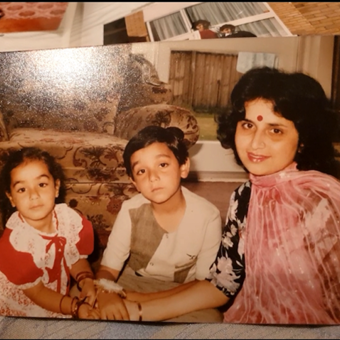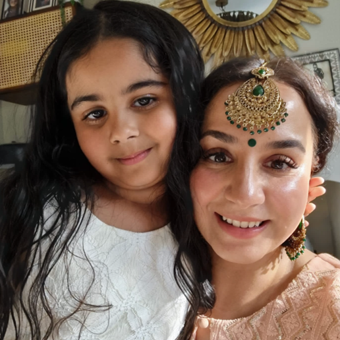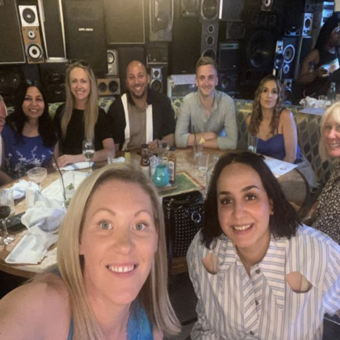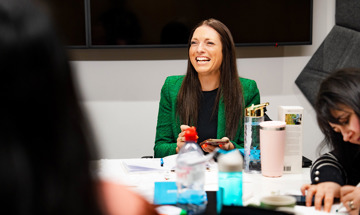Growing up, I felt different – and feeling different back then was not a good thing.
But when I joined Centrica, I felt like I could be more me than I had been before, and that’s when I realised that acceptance had to start with accepting myself.
Over the last few years, since becoming a mum and watching my daughter grow, I’ve seen how change for me leads to change for her and others who have experienced discrimination. That’s one of the main reasons why I’m so passionate about promoting diversity and inclusion.
But before we get into that, let’s go back to the very start of my story.
Not fitting in
I experienced my fair share of racism during my childhood and early adulthood.
Instead of standing tall and being proud of my heritage, I felt quite the opposite; embarrassed and attacked for my skin colour, the food in my lunch box, even my name. Can you imagine your teacher giving you a nickname, because yours is “too hard to pronounce”? My name is Neetu. It’s not difficult. In fact, it means beautiful. I just didn’t realise or feel it back then.
I guess more than anything, I just wanted to belong.
From straightening my ringleted hair to wearing make-up that was far too light for my skin, I tried everything in my search for acceptance. But time and time again, my efforts failed.
And because racism and racial abuse was (and still is) scary, it was a case of saying nothing, trying to accept it and moving on, out of fear. Because when you don’t feel you belong, it’s easy to accept all the negativity happening to you – it all validates that feeling of not fitting in.
What I didn’t anticipate was how everything was going to change for me.

A turning point
At the age of 21, I interviewed for a role at Centrica.
That day was full of nerves, and I was pretty sure that I messed up from waffling too much. But to my surprise, I was offered the role, despite my lack of experience. I remember asking the recruiter several times if it was a mistake or not. It wasn’t.
Shortly after joining the company, I realised that I didn’t need to try to fit in here. It was refreshing, liberating and such a relief to feel like I could finally be myself, or at least be more of myself than I ever had been. And it also made me realise that I needed to accept myself, my whole self, or else nothing would change.
And while that’s something I’ll always be working on, I continue to feel blessed to be part of a team that’s full of support, to have a manager that is my biggest cheerleader. Every day I can be funny me, anxious me, sometimes very opiniated me, mummy me, daughter me, Indian me, and crucially, all of me.
Having courageous conversations
Over the last few years, it’s been really positive to see the wider narrative around diversity and inclusion start to change.
Instead of ignoring our differences, we celebrate them. We see colour. We see heritage. We’re loud and proud about the things that make us unique.
I continue to see the impact of this shift on my daughter, Mila, who talks proudly of her heritage and always shares her “home” in school show and tells. She also tells me I look the prettiest when I am wearing a traditional Indian outfit (which I now tell my own mum at every opportunity!).
This all starts with having courageous conversations – building communities of support, and allyship, through honesty, understanding and education. This is how you tackle unconscious bias. This is how you affect lasting change.
I can honestly say that since joining Centrica over twenty years ago, the organisation has come a long way in facilitating open dialogue, and our employee-led networks continue to play a huge role in that.
Here are just a couple of recent events at work helping to drive the conversation forward:

A safe space to talk
We recently had our second Courageous Conversation about race, where our amazing team came together again to be honest, vulnerable and brave, discussing the challenges we’ve faced as people of colour. With this being the second Courageous Conversation, it was great hearing how our first round inspired important discussions both inside and outside work, showing the positive impact of these talks. This is the video we shared in our meeting – I’d encourage everyone to give it a watch.

An open mic to remember
Our amazing Women’s Network hosted an open mic session a few months ago, giving women across the business a platform to talk about any topic for ten minutes. For me, I spoke candidly about finding acceptance, from my school days to motherhood. Not only was it empowering to share my story, but it was truly inspiring to hear about the challenges other women have faced. This session made it clear that we’re really all in this together.
But building an inclusive and open workplace isn’t just important for our existing colleagues. It’s key to attracting exciting new talent from all walks of life.
Championing the next generation
Knowing the feeling of not fitting in is why I’m so committed to building an inclusive workforce that leaves nobody behind.
But it’s not just the right thing to do on a human level. It’s also great for business.
Studies continue to show that people from minority groups bring a lot of value to a company. For example, according to research by JP Morgan & Chase, 92% of autistic people are more productive than their non-autistic counterparts.
One way we’re building that team is by partnering with external job boards, universities and deans that are equally dedicated to closing the diversity gap within STEM.
And it’s not just graduates we’re targeting – with only 3% of women saying a career in tech is their first choice, we know that recruitment must start early to be effective. So we’re getting our opportunities in front of young people, from all walks of life, as early as possible.
Building a diverse team, one young mind at a time.
The beauty in our differences
As a final thought, whatever your role in work or outside of work, it’s so important to keep the conversation going. Ask the awkward questions. Keep looking for the beauty in our differences.
For leaders, define your ambitions, embrace change and please don’t look for people to fit into your culture. Hire, promote and develop those that will add to it.
Together, we can make sure that everyone wins.

Case Study
Centrica's Market Leading Commitment to Trans Inclusion
Our people

Case Study
Chris O'Shea: The Employment Rights Bill will be good for business.
Our people

Case Study
In conversation with... Victoria Belkhyate
Our people

Case Study
Meet the Fathers of Centrica
Our people

Case Study
Black History Month: Reclaiming Narratives
Our people

Case Study
The Working Parents of Centrica
Our people
